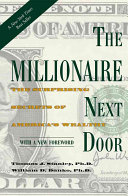Reading List
-
 The Uninhabitable Earth
The Uninhabitable Earth"The Uninhabitable Earth hits you like a comet, with an overflow of insanely lyrical prose about our pending Armageddon."--Andrew Solomon, author of The Noonday Demon It is worse, much worse, than you think. If your anxiety about global warming is dominated by fears of sea-level rise, you are barely scratching the surface of what terrors are possible. In California, wildfires now rage year-round, destroying thousands of homes. Across the US, "500-year" storms pummel communities month after month, and floods displace tens of millions annually. This is only a preview of the changes to come. And they are coming fast. Without a revolution in how billions of humans conduct their lives, parts of the Earth could become close to uninhabitable, and other parts horrifically inhospitable, as soon as the end of this century. In his travelogue of our near future, David Wallace-Wells brings into stark relief the climate troubles that await--food shortages, refugee emergencies, and other crises that will reshape the globe. But the world will be remade by warming in more profound ways as well, transforming our politics, our culture, our relationship to technology, and our sense of history. It will be all-encompassing, shaping and distorting nearly every aspect of human life as it is lived today. Like An Inconvenient Truth and Silent Spring before it, The Uninhabitable Earth is both a meditation on the devastation we have brought upon ourselves and an impassioned call to action. For just as the world was brought to the brink of catastrophe within the span of a lifetime, the responsibility to avoid it now belongs to a single generation.
Read more -
 Global Crisis
Global CrisisAn accessible synthesis of the prescient best seller exploring seventeenth-century catastrophe and the impact of climate change First published in 2013, Geoffrey Parker’s prize-winning best seller Global Crisis analyzes the unprecedented calamities—revolutions, droughts, famines, invasions, wars, and regicides—that befell the mid-seventeenth-century world and wiped out as much as one-third of the global population, and reveals climate change to be the root cause. Examining firsthand accounts of the crises and scrutinizing the prevailing weather patterns during the 1640s and 1650s—longer and harsher winters, and cooler and wetter summers—Parker reveals evidence of disrupted growing seasons causing malnutrition, disease, a higher death toll, and fewer births. This new abridged edition distills the original book’s prodigious research for a broader audience while retaining and indeed emphasizing Parker’s extraordinary historical achievement: his dazzling demonstration of the link between climate change and worldwide catastrophe 350 years ago. Yet, the contemporary implications of his study are equally important: are we prepared today for the catastrophes that climate change could bring tomorrow? At half the original length, this user-friendly abridgment is ideal for students and general readers seeking a rapid handle on the key issues.
Read more -
 The Millionaire Next Door
The Millionaire Next DoorThis bestselling resource identifies seven common traits that show up again and again among those who have accumulated wealth. The new edition, the first since 1998, includes a new Foreword for the 21st century by Dr. Stanley.
Read more